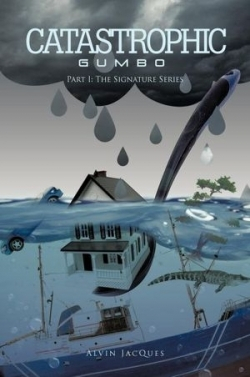Catastrophic Gumbo: Part 1
The Signature Series
New Orleans is like no other city in the United States. Therein lies a difficulty. Because of its singularity, the acceptable yardstick used on other cities cannot measure the Big Easy. Likewise, Catastrophic Gumbo, a memoir of Hurricane Katrina and its devastation of New Orleans, written by jazz musician and New Orleans native Alvin JacQues, is an unusual book that must be evaluated on its own terms.
In Catastrophic Gumbo, JacQues relates his story of how Hurricane Katrina destroyed New Orleans in August of 2005. It is much like sipping bourbon at the bar in Tujague’s on Decatur Street and listening to a local tell you about Katrina in a style that is truly New Orleans. When Katrina hit, JacQues was living in the lower Ninth Ward, the part of the city that was completely flooded by the hurricane. JacQues tells how he helped safeguard eight of his neighbors until the coast guard evacuated them to the Super Dome. JacQues and his girlfriend eventually travelled to Houston and, ultimately, made their way to Philadelphia. It is a remarkable story.
It is made even more remarkable by the author’s creative wielding of the English language. JacQues uses no conventional punctuation. Spelling is improper and sentence structure is mind-boggling. Trying to describe the reaction to the sudden flooding in his neighborhood, JacQues writes: “The intensity of these tragedies few tried to forget it happen, to erase the pain in there minds only to cope outside the reality of the truth the city will never forget the behavior of the acts of survival to stay alive.” On the other hand, later the author describes his rescue by the coast guard, and succinctly concludes: “We were dancing in the arms of God.”
Catastrophic Gumbo is also notable for its unique format. Most of the book is printed across the middle of each page, leaving nearly four-inch margins at top and bottom. The latter sections, containing information about Alvin JacQues’ performance history, a vignette on the 2010 Gulf of Mexico oil spill, and details about New Orleans, are presented in a more conventional layout.
JacQues ricochets off the story of the flood to touch momentarily on the problems associated with Chinese drywall used in the reconstruction of homes in New Orleans. It was an accurate hit, and his concerns recently have been proved correct. In fact, millions of dollars in damages have been paid by the manufacturer.
It is impossible to overlook the peculiarities and inconsistencies abundant in Catastrophic Gumbo. But hidden amongst the linguistic flotsam and jetsam floats a firsthand account of an ugly, modern-day disaster.
It takes varied ingredients to build the true history of an event. Alvin JacQues, in Catastrophic Gumbo, has added his unique flavor to the stew. He lived it, and who is to say his is not a valuable contribution to the truth of the destruction of New Orleans by Hurricane Katrina?
Reviewed by
John Michael Senger
Disclosure: This article is not an endorsement, but a review. The publisher of this book provided free copies of the book and paid a small fee to have their book reviewed by a professional reviewer. Foreword Reviews and Clarion Reviews make no guarantee that the publisher will receive a positive review. Foreword Magazine, Inc. is disclosing this in accordance with the Federal Trade Commission’s 16 CFR, Part 255.

